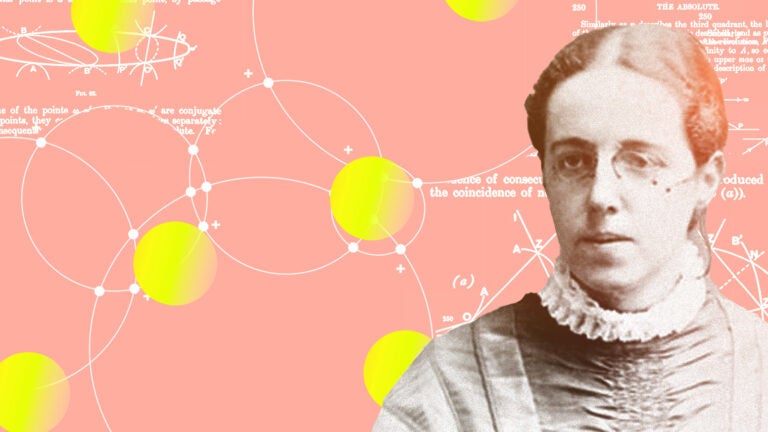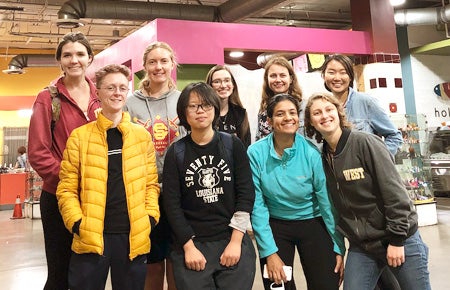
Charlotte’s Web spins academic success for women in mathematics
Over the course of nine frigid days in January 1880, Charlotte Angas Scott tackled the Cambridge University Mathematical Tripos Exams. As a woman, she had been required to gain special permission to take the exam, generally reserved only for men. She finished with the eighth highest score — and was promptly barred from the all-male award ceremony and omitted from the official honors list.
Scott wasn’t actually a student at Cambridge, which wouldn’t make women full members of the university for another 50 years. She was officially enrolled at the then all-women Girton College nearby, attending classes at Cambridge when professors allowed. This was risky. Cambridge jailed women they suspected of having a “corrupting influence on male students” in a prison called “Spinning House.”
News of her ground-breaking success on the exams spread, and subsequent publicity forced the university to allow all women to take the tests, their names now appearing alongside their male compatriots.
For most of her career, Scott taught at Bryn Mawr College in Pennsylvania, where she was a founding faculty member and the first mathematics professor. She mentored seven women mathematics Ph.D. students though their dissertations. She was the chief mathematics examiner for the College Entrance Examination Board, developing testing standards that remained unchanged for more than 80 years.
Nearly 100 years after her death, one club at USC Dornsife College of Letters, Arts and Sciences is carrying on her legacy of advancing women in mathematics. The USC Women in Math Group: Charlotte’s Web, named for Scott, helps women and non-binary people studying mathematics achieve success by building a broad web of support.
“The goal of the club is for women to feel there is a place for them in mathematics, that they are comfortable and have a network both in the department and in the field,” says Cymra Haskell, professor of mathematics and founder of Charlotte’s Web.
Warning: road blocks ahead
Since Scott’s exam days, women have made great strides in STEM (science, technology, engineering and math). They now account for 53% of the world’s bachelor’s and master’s degrees in these fields, according to a UNESCO report. Equity in math remains elusive, however. From 1995 to 2014, the number of women graduating with bachelor’s degrees in math and statistics declined, from 46.9% of graduates to 41.7%, and women still make up less than 30% of those graduating with a doctoral degree, according to the National Science Foundation.
Haskell feels the often brutally competitive nature of the field may have something to do with this gap.
“Women are socialized to not tolerate competitive environments in the same way as men, who feel like they have to just put up with it,” she says.
“In math you’re constantly told you’re wrong because there are actually right and wrong answers,” says Haskell. For those struggling to make space for themselves in a field where they are the minority and where they may be viewed as less competent, this sort of environment can quickly become discouraging
For Kelley Yang, an undergraduate in mathematics, the esoteric field can also be a lonely place.
“Studying mathematics — especially pure math — can feel isolating because there are no immediate practical applications to the ideas that are taught. There isn’t even a common language for discussing the topics with people who don’t have familiarity with math,” Yang says.
Haskell finds that women dropping out of math aren’t quitting because they dislike work. “They internalize their dislike as not liking the field, rather than acknowledging that the environment is off.”
World wide web
The solution to this isolation and discouragement, Haskell believes, is to create spaces within the field where women and non-binary people feel welcomed, celebrated and supported by their peers. “A network and community of friends make you feel excited about the math, rather than always feeling inadequate”.

The power of mentorship is personal for Haskell. Her own career was shaped by Ami Radunskaya, professor of mathematics at Pomona College, who founded the Enhancing Diversity in Graduate Education (EDGE) program. EDGE helps women successfully complete doctoral programs in mathematics and take on prominent leadership roles in the field.
Students in Charlotte’s Web also list women mathematicians as role models. Doctoral student Eilidh McKemmie cites mathematics professor Karin Erdmann, an expert in modular representation theory, at the University of Oxford, where McKemmie completed her undergraduate studies. Yang mentions Maryam Mirzakhani, the first woman to win the prestigious Fields Medal in mathematics.
“She was known for putting her ideas to paper by drawing fantastical things, which reminds me that beautiful math can come out of experimenting in fun and whimsical threads of thought,” says Yang.
Web of connection
Charlotte’s Web came to fruition at USC Dornsife in 2001, thanks to USC’s Women in Science and Engineering (WiSE) program. Haskell pitched her proposal to WiSE and received funding to start a club.
“The first time I sent an email invitation to the women math graduate students, I thought no one would show up,” she recalls. “Then a ton of people showed up to the first meeting and I thought, ‘Wow, maybe there’s been a need.’”
Every academic year, the club hosts a wide variety of activities aimed at community-building, from dinner lectures to networking teas to kayaking. In 2019, the club organized a weekend retreat at the USC Wrigley Marine Science Center on Catalina Island off the coast of Los Angeles where women mathematicians talked frankly about the challenges they face in the field.
Noting the supportive and diverse nature of the club, Yang recounts her first event with Charlotte’s Web, at a rock-climbing class in Culver City.
“Everyone was cheering and encouraging each other. At dinner after, I started to shake off the sense that I had been doing everything wrong — taking the wrong classes, or doing the wrong independent reading — because I saw how diverse the group was, as diverse in their mathematical interests as in their demographic backgrounds.”
Connections remain after graduation, too. Haskell referred a graduate to an alumna who helped her embark on a successful actuary career. A few years later, Haskell referred another alumna to them, who started work at the same firm.
For Haskell, supporting the success of women in math is not just about achieving gender parity, but about advancing the discipline. Women dropping out of the field could mean losing the one person who could fill an essential gap.
“There is evidence that having a diverse group means people make better decisions,” she said. “In math, there a lot of people doing work that, individually, doesn’t feel like it’s doing much for the discipline. But it’s the cumulative effects of the work that allow people to make a big step. It’s the filling in of holes.”